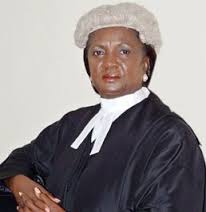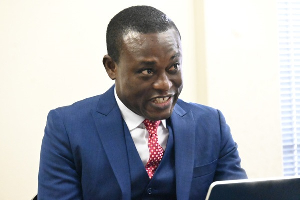A highly respected corporate leader sent me this story titled Tsatsu accuses Justice Anin Yeboah of political bias. Saturday afternoon. It came an hour or so after I stepped off the set hosting newsfile.
The edition my guests readily agreed to my labeling it “the non substantive matters arising from the Supreme Judgment.” Of course, we could not attempt to discuss a judgment which was not available for our study. I am surprised that that is difficult for some political commentators to do. I am also completely shocked at some of the comments and criticisms so far going to the heart of a judgment the discussants/critics have yet to see.
Before I get down to the chief purpose of this piece, I would like my colleague current affairs show hosts and the political and social commentators to be reminded (and I know most of you must have heard me say this just too many times) that Ghana’s Supreme Court per Justice Bamford-Addo in the famous Page 28 case, Republic v Mensah-Bonsu: Ex parte Attorney-General (1994-95) GBR 130, has held that “Criticism of the court and of judicial decisions however rambunctious, whether or not in good taste, and despite inaccurate statements of fact, would not amount to contempt of court and is within the limits of the inalienable right of every individual’s freedom of speech”.
So all we need is a little patience because when the judgment is available we are at liberty to mount the most violent criticisms. But that surely ought to be done within the constitutional limits of the freedom of expression and the legal injunction against scurrilous abuse or scandalizing the court or judges by imputing ill motives and bringing the administration of justice into disrepute – that would be criminal contempt and same is punishable by a term of imprisonment or a fine or both or such other sanctions as the court deems appropriate. You don’t lose anything by being “measured” and tempered” in your criticisms.
But it ought to be said also that the judicial service has not been speedy in making available judgments of cases of public interest such as this one in good enough time. I remember the frustrations in chasing after certified true copies of the Waterville and Isofoton judgments. The judgments often become available long after they are delivered. The fast Ghanaian media is left to dwell on the notes taken by reporters while the judgment was being delivered for the commentaries and discussions and this often results in incomplete or distorted analysis.
Now to what my attention was drawn to. The mail came with a short question: “Did this happen?” I read that story in utmost disbelief much in the same way as the one who brought it to my attention. I have great respect for the eminent barrister and so doubted the story until I could double confirm its contents. I was hugely disappointed and sad and asked:
“Floodgates for mudslinging their Lords opened a little wider with a second senior lawyer's punch?” I would shortly realize that the reported comments had gone viral on social media with unprintable vituperations and words of condemnation over the attack. It had become a political football with sympathizers of the NDC and NPP going full blast at the justices along Tsatsu’s line of argument. The full text of my question was: “Floodgates for mudslinging their Lords opened a little wider with a second senior lawyer's punch? I hope not. But if the evidence of incurable political bias arising from who appointed which Judge plus a Judge's consistent voting pattern on a number of issues was the standard of proof required, I can imagine how the politicians will make a meal of this line of analysis to smear all the Judges. They (Judges) certainly cannot be infallible, but shall we endorse the sort of baseless grounds upon which other senior lawyers vilified them and got convicted of intentional criminal contempt?”.
It wasn’t long before I read what was reported to be a reply or reaction to the claim by the NPP scribe under a six-month’s bond to be of good behavior, Sir John. It was titled “ Sir John descends on Tsatsu Tsikata, cautions him against attacking the judiciary.
I have subsequently read what is attributed to lawyer and Executive Director of the Danquah Institute Gabby Asare Okyere-Darko entitled “ Election petition verdict was “corrupt judgment and I feel sad and fear what to expect when the reasons for the outcome of the 2012 election petition are available to all. Tsatsu has one additional reason for his accusation. But whatever and how many the reasons, I find them (for now) to be mere suspicions grounding his accusation of political bias. I, without any equivocation, would say the accusation is, at the least, most unfortunate. I am always reminded as per the Supreme Court in State v Ali Kassena (1962) 1 GLR 144 that “a multitude of suspicions put together cannot constitute proof”. And if one, especially a lawyer, has proof of professional misconduct such as claimed, they ought to use the appropriate channels of complaint and pursue same with evidence to procure the necessary disciplinary sanctions against a judge.
I am, and I guess the public too is, aware that some judges have suffered various sanctions for various acts of professional misconduct. I have had reason at a point in my few years of practice to believe that a judge had been biased towards me. I contemplated making a case after encountering repeated occasions of what I suspected to be intimidation and ill treatment. The channels of complaint exist, so I wrote a petition and adduced reasons to ground a complaint.
But I later, for very good reason, decided to suspend the action and hope I didn’t suffer any more of it. Members of the Bar are aware and have reported the conduct of judges to the appropriate unit of GBA or lodged a complaint at the CJ’s and have had results even though the process reportedly is often fraught with delays. A critical point to note is, failure to follow due process and to bring professional misconduct of a judge to the attention of the CJ, misconduct that one has incontrovertible evidence to prove, is to deprive authority of the chance to check same as such misconduct is rather perpetuated.
I will quote the Chief Justice Georgina Theodora Wood when she addressed newly enrolled lawyers on the 30th September 2011 to illustrate why a first recourse to the media is most unfair, unprofessional, injurious to the administration of justice, and why the Ghana Bar Association is invited to quickly step in and bring some sanity. She said among other things thus: "A number of political and religious leaders have expressed grave concern about the rather negative trend which has reared its head in some of our public political discourses, in particular, that is the culture of insults. It has been said that this is clearly alien to our societal values and norms. Unfortunately, this kind of behavior has wormed it's way into our fraternity as well.
The kind of vituperation sometimes heaped upon judges and courts by some members of the public, including, sadly, members of the legal profession, tells it all. I trust that you will not follow that path. Emulate lawyers whose constructive contribution to civil debate in a wholesome manner engender trust and promote public confidence in the judiciary, national peace and security. ...the global view is that Bar Associations have a pivotal role to play in promoting strong judiciaries. Restrain from spreading unsubstantiated and malicious allegations against professional colleagues.
Bar Associations have been entrusted with a sacred responsibility to assist in upholding the independence and integrity of the courts. The Canons of Legal Ethics explains that: "Judges, not being free to defend themselves are entitled to receive the support of the legal profession against unjust criticism and complaint." I am not suggesting for a moment that the judiciary and judges are above criticism. No, we have never been advocates of the culture of silence as far as our operations are concerned. Neither are we soliciting from the Ghana Bar Association, blind allegiance or loyalty, even when we are plainly in the wrong. How else can we initiate reforms and improve upon justice delivery, if we rejected criticism?
Our call for support in terms of global best practice relates to those situations where the circumstances, given the internal culture of the judiciary, would not simply allow us to mount public platforms and respond in similar vein to allegations of professional misconduct which are intended to inflict reputational damage to the institution and/or individual judges. On such occasions, judges have to rely on the goodwill of independent advocates to defend their causes before the general public. Although the lawyer for a greater part of his career will be faced with one dispute or the other in the litigation branch of the profession, the beauty of the profession is to conduct his/her case without acrimony and with civility”.
I had cause as President of the Ghana School of Law four years back, to express similar concern about the reckless bastardization of the judiciary at the time. Political party supporters were besieging court premises during trials of their members for various offences. I charged the Ghana Bar Association to be up and doing in that regard. This is how Ghanadistricts.com reported my speech read at the official opening of the Law Week Celebration. NATIONAL: Good judges still exist. Mr. Samson Lardy Ayenini, President of the Ghana School of Law (GSL) Students Representative Council (SRC) has condemned politicians who give political colour to laws and turn people against good judges.
Citing the interpretation of the law on causing financial loss to the state, Mr. Ayenini noted that judges needed great courage over such cases adding, they risked their integrity of being impugned and being demonized.
Speaking at the launch of GSL 51st SRC week celebration in Accra on the theme: "Upholding Fundamental Human Rights; the role of the law student," Mr. Ayenini noted that that some politicians had now turned themselves into courts of law as well as arrogating to themselves the sacred role of law Lords.
He said two political parties were guilty of "the sacrilege" of also passing judgment on cases that involved their members. Mr. Ayenini said students were saddened at the way in which pure law which was taught by the best legal brains in the world was subjected to reckless adulteration by politicians.
The SRC President mentioned that "the blood curdling screams by rampaging mobs at the courts must end" adding, "the phenomenon posed a serious threat to the administration of justice and compromised the rule of law."
According to Mr. Ayenini, “the sooner we moved from the new threat of coups against objective reasonable laws and impartial administration of justice in Ghana, the better".
The SRC President observed that judges were not some "infallible Zeuses" whose conduct if found to be improper, must not be questioned adding, "we must cut out, exorcise the politics and do the critiques using fair objective standards".
He therefore tasked the Ghana Bar Association to revisit the days when it took frontline stand in shaping national discourse and influencing policy.
"The GBA must win back the trust of our people, especially the poor and vulnerable by erasing the perception that those they trust to fight for them soon forget their oath and pledge to be men not of timorous souls who would do justice without fear or favour."
I say this to all, that letting the excesses pass, is letting our dear country and posterity down big time.
General News of Monday, 2 September 2013
Source: Samson Lardy Ayenini
Comment: SC Justices under siege – GBA must hear the Chief Justice’s cry now













